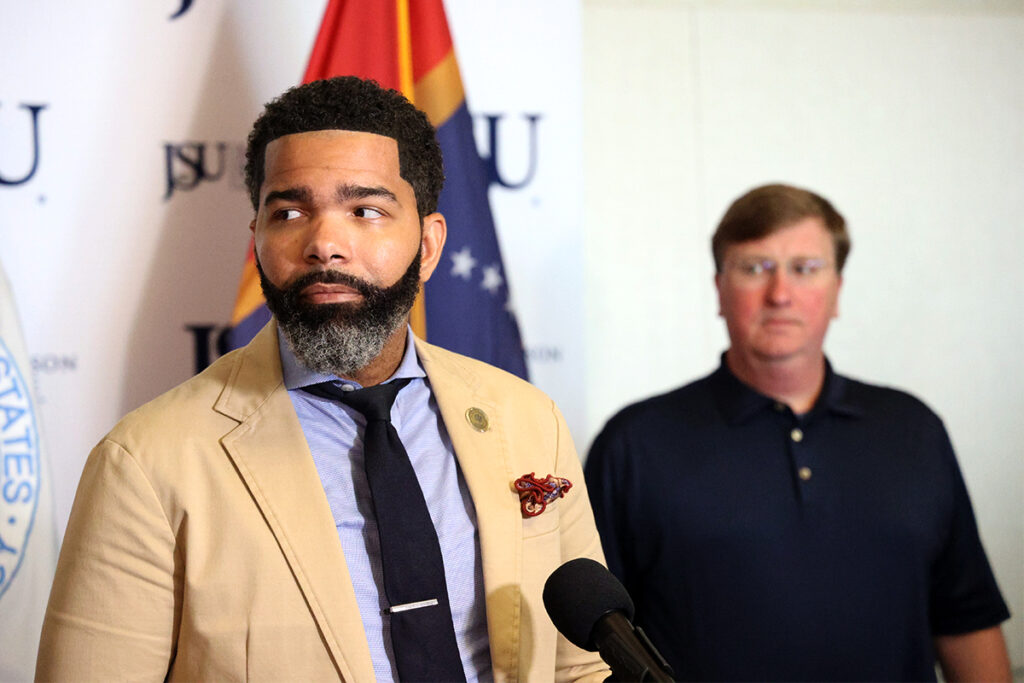JACKSON, Miss.—For the first time in recent memory, virtually all stakeholders in the future of Mississippi’s capital city came together Wednesday to discuss the Jackson water crisis that has left more than 160,000 residents without clean water for over a month.
Environmental Protection Agency Administrator Michael S. Regan, Mississippi Gov. Tate Reeves, Jackson Mayor Chokwe A. Lumumba, U.S. Sens. Cindy Hyde Smith and Roger Wicker, and Reps. Bennie Thompson and Michael Guest held a joint meeting on Wednesday to discuss the immediate future of Jackson’s beleaguered water system.
Afterwards, at a press event at Jackson State University, Regan offered an understated summary of the crisis and his agency’s response.
“Jackson, like many cities across the country, has a fragile water system. It’s our job to ensure that every person in this country has access to clean drinking water,” Regan said in the Jackson State University Student Center.
Reeves and Lumumba flanked him on either side. The crisis itself is far from over, but a collective meeting of leadership from the State, City and federal governments may signal cooperation long missing in Jackson’s recovery.
‘There Are More Resources’
At the presser, Regan stressed that the current focus is the immediate needs of the water system—maintaining pressure and ending the boil-water notice that has now extended for longer than a month. “We had a very good conversation about the urgency of staying close and working in a coordinated fashion for the people of Jackson,” Regan said.
The meeting’s second purpose was to discuss the funds available for “medium-term solutions” with all parties involved, the EPA administrator said.
“The State of Mississippi will receive more than 26 million in SRF (State Revolving Loan Funds) in 2022. And that’s on top of 30 million that’s available in 2021 loan funds for Jackson … in addition to 13 million that currently exists,” Regan explained. “We believe that there are even more resources that we can access, but we know that it will require all of us working together to cut through the bureaucracy (and) have open lines of communication.”

Gov. Reeves took a conciliatory tone in his remarks, acknowledging the dire state of infrastructure across the country. “Here in this city, as well as in virtually every jurisdiction across America, there is aging infrastructure that has to be dealt with. And much of the conversation today was about unlocking monies that are available through the traditional funding sources as well as others.”
Mayor Lumumba also highlighted the revolving loans as a source of discussion—and an immediate opportunity for addressing some of the critical needs in Jackson’s water-distribution system.
Due to the many repairs the Rural Water Association Mutual Aid Agreement fund made possible, Lumumba said, “there has to be some reassessment of different SRF loans and how they have to be prioritized.”
Ultimately, the parties seemed in agreement that the $43 million in available SRF loans would be Jackson’s next step for funding improvements to its water plants. But Lumumba reiterated his concerns about the SRF program to the Mississippi Free Press.
“There is a process that allows (the debt to be forgiven), and we hope to get as much of it forgiven as possible … (but) from the City’s vantage point, it’s going to require a little more than just a loan program, because affordability becomes an issue. The city’s debt structure becomes an issue for that,” he said.
Boil Notice Likely To Last Through Week
Jackson’s water system is making strides toward recovery, but officials warn that the acute phase of the Jackson water crisis is not yet over. As of Wednesday, the City had yet to begin full sampling to confirm the safety of the water coming from the O.B. Curtis Water Treatment Plant.
“If you’re producing perfectly clean water out of the facility, it typically takes about three days to get the entire system flushed (of) water that was already in the system,” Gov. Tate Reeves explained at a Sep. 7 press event. So I don’t think Friday is realistic (for lifting the boil-water notice.)”

After weeks of inconsistencies, Jackson’s water pressure is back up to par, at least. Regular City updates confirmed that the pressure in the system is nearing optimal levels, providing an opportunity for quality testing that is the final step before lifting the boil-water notice and escaping the acute phase of the water crisis.
Still, in a Thursday morning update, City officials acknowledged that water quality testing was still in its preliminary phases. “Investigative sampling will continue today to monitor water quality,” the statement read. “At this time the distribution system is not ready for full sampling to clear the boil water notice. We will continue to evaluate when full sampling can begin.”
But even once Jackson has drinkable water again, the crisis will continue. Jackson’s distribution system remains outdated. Its water plants are in dire need of improvements. And perhaps above all else, the system desperately needs qualified personnel, including Class A Water Operators and regular maintenance staff.
The most promising news on that front came with the City of Jackson’s regular Wednesday update, with officials announcing that the Mississippi State Department of Health had granted provisional Class A licenses to two previously licensed water operators. The move doubled the available Class A water operators working full-time at the O.B. Curtis plant to four. Officials say the plant needs eight more Class A operators to operate at full capacity.
Public-health officials, including EPA experts assisting Jackson on the ground, say that a properly staffed O.B. Curtis could prevent the cyclical dangers of wear and weather events like 2021’s freeze and 2022’s flooding that triggered the most severe stages of the crisis so far.









